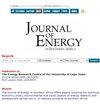An intelligent alternating current-optimal power flow for reduction of pollutant gases with incorporation of variable generation resources
IF 0.6
4区 工程技术
Q4 ENERGY & FUELS
引用次数: 1
Abstract
Frequent escalations in fuel costs, environmental concerns, and the depletion of non-renewable fuel reserves have driven the power industry to significant utilisation of renewable energy resources. These resources cannot satisfy the entire system load demand because of the intermittent nature of variable generation resources (VGRs) such as wind and solar. Therefore, there is a need to optimally schedule the generating units (thermal and VGRs) to reduce the amount of fuel used and the level of emissions produced. In this study, an AC-power flow in conjunction with combined economic and environmental dispatch approach through the implementation of a modified constricted coefficient particle swarm optimisation was used to minimise the fuel cost and the level of emission gases produced. The approach was applied to the Institute of Electric and Electronic Engineers 30 bus test system through three different load conditions: base-load, increase-load and critical-load. The results showed the practicality of the proposed approach for the simultaneous reduction of the total generation cost and emission levels on a large electrical power grid while maintaining all the physical and operational constraints of the system.一种结合可变发电资源的智能交流-优化潮流,用于减少污染气体
燃料成本的不断上升、环境问题以及不可再生燃料储备的枯竭,促使电力行业大量利用可再生能源。由于风能和太阳能等可变发电资源(vgr)的间歇性,这些资源无法满足整个系统的负载需求。因此,有必要对发电机组(热机和vgr)进行优化调度,以减少燃料使用量和产生的排放水平。在这项研究中,通过实施改进的收缩系数粒子群优化,将交流电力流与经济和环境调度相结合,以最大限度地降低燃料成本和产生的排放气体水平。将该方法应用于电气和电子工程师学会30总线测试系统,通过三种不同的负载条件:基本负载、增加负载和临界负载。结果表明,在保持系统所有物理和运行约束的同时,所提出的方法可以同时降低大型电网的总发电成本和排放水平。
本文章由计算机程序翻译,如有差异,请以英文原文为准。
求助全文
约1分钟内获得全文
求助全文
来源期刊

Journal of Energy in Southern Africa
ENERGY & FUELS-
CiteScore
3.00
自引率
0.00%
发文量
16
审稿时长
6 months
期刊介绍:
The journal has a regional focus on southern Africa. Manuscripts that are accepted for consideration to publish in the journal must address energy issues in southern Africa or have a clear component relevant to southern Africa, including research that was set-up or designed in the region. The southern African region is considered to be constituted by the following fifteen (15) countries: Angola, Botswana, Democratic Republic of Congo, Lesotho, Malawi, Madagascar, Mauritius, Mozambique, Namibia, Seychelles, South Africa, Swaziland, Tanzania, Zambia and Zimbabwe.
Within this broad field of energy research, topics of particular interest include energy efficiency, modelling, renewable energy, poverty, sustainable development, climate change mitigation, energy security, energy policy, energy governance, markets, technology and innovation.
 求助内容:
求助内容: 应助结果提醒方式:
应助结果提醒方式:


